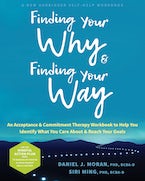By Daniel J. Moran, PhD, BCBA-D and Siri Ming, PhD, BCBA-D, coauthors of Finding Your Why and Finding Your Way
Mindful action is purposeful, present-focused, committed behavior while maximally attending to what you choose to make important while unhindered by distractions. We understand we’re throwing some nerdy applied behavioral science terms at you right off the bat, but bear with us as we aim to communicate the concept of mindful action in an understandable manner while also staying true to the science of human behavior. After all, the Mindful Action Plan is built on an evidence-based psychological approach known as acceptance and commitment therapy (Hayes, Strosahl, and Wilson 2012). Before we get to the explanation of acceptance and commitment therapy (ACT) and how it applies to the MAP, let’s carefully unpack the definition of mindful action.
Mindful Action Is Purposeful
Being purposeful is one of the main aims of the MAP. Merriam-Webster defines “purposeful” two ways:
1. fully committed to achieving a goal
2. made, given, or done with full awareness of what one is doing
Mindful action is fully committed to achieving a goal, and done with full awareness of what one is doing. Throughout this book, we’ll highlight how to build skills not only for executing goal-oriented behaviors but also for creating habits that are directed by what you value, and for keeping your awareness sharp while doing so. If you look up the word “why” in the Merriam-Webster dictionary, you’ll see that it means “for what…purpose.” In other words, when you’re finding your why, you’re finding the reason to be purposeful.
Mindful Action Is Present-Focused
Now is the only time you can engage in goal-oriented behaviors and value-directed habits. You cannot behave tomorrow, nor can you behave yesterday. You can’t behave in five minutes or five minutes ago. Now is the only time action happens. This is why we strongly encourage meditation practices, even as secular behavioral scientists who have no agenda for changing your spiritual or religious beliefs.
Practicing the skills that meditation teaches—like the ability to encounter your own experience as it is in the moment, without judgment—aids you to be more reliably in the here and now, meaning you’ll be focused on your actions and the world around you. If you want to have a life well lived, then becoming more aware of what you’re doing in the present moment plays a role in that endeavor. If signals from the world cue you to do a valued action here and now, but you’re too busy thinking about other things there and then, you won’t embrace life’s opportunities as impactfully as you could. Practicing mindful action can positively influence your ability to stay present-focused so you don’t miss vital opportunities.
Metaphorically speaking, sometimes we’re like a person listening to the radio while wearing headphones. At times, we hear the deejay playing an uninteresting, crummy song recorded in the past, and other times, the deejay is advertising something going on far away and in the future. While wearing these headphones, we’re awash in sounds from the radio about there and then that distract us from focusing on what’s happening here and now. Unfortunately, the headphones also prevent us from hearing when the world whispers, “Hey, here’s a real opportunity for you to have the life you want to lead right now!” Instead, we only hear loud, repetitive ditties from the past or advertisements that lure us into the future, and we miss the precious possibility. How often have you missed those whispers? How many more subtle cues will go unheard while you remain stuck thinking about the past or the future and missing great opportunities to live your life well? The Mindful Action Plan helps you remove those headphones, listen more carefully to your vibrant environment, and generate motivation to take advantage of every valuable opportunity.
Mindful Action Involves Committed Behavior
Getting where you want to go requires taking overt, measurable steps. It involves committed action. A commitment is action in the direction of what you care about even in the presence of obstacles. Let’s dissect that definition:
“action”—As you can see in the first word of our definition, committing requires acting. When it comes to living a life of purpose and vitality, many people say they’re committed to certain things, but they often don’t act that way. Just talking about doing something is not committing. You must identify behaviors leading to a life of purpose and vitality, and then choose to take those actions.
“in the direction of what you care about”—This suggests commitments are personal and based on your values. When you find your why for making the commitment, clarifying your reason for caring about the processes and outcomes of your effort that link your actions to the things you value, you’re more likely to maintain those commitments over the long term.
“even in the presence of obstacles”—This reminds us that accomplishing important tasks is not simple or easy. Your chance for success is increased by devising a plan for dealing with complications, because hurdles will inevitably arise. Committed behavior does not stop when difficulties occur—acknowledging that there are stumbling blocks, and working to solve them, is one of the hallmarks of committed action.
Mindful Action Involves Maximally Attending to What You Choose to Make Important
The Mindful Action Plan can be about anything you want. Your aims for personal growth are related to what you value, and we can’t tell you what you should choose to make important. We’ve seen the MAP be useful for doing many important things like starting an art career, raising a troubled child, starting a business, raising money for charity by running distance races, improving relationships, recovering from addiction, and becoming healthier. The MAP can help you with your own personal-growth goals. Alternatively, the MAP can also support you to take that gut-wrenching step upward from the abyss, forward from your paralyzing fear, or toward a place of well-deserved health and self-kindness. This journey shall be what you choose to make important.
We also want to highlight what we mean by the nerdy phrase “maximally attend to” in the heading above. Mindful action is about effectively focusing—for as long as it takes—on successfully completing your present goals while expressing your life-long values. In other words, mindful action is about focusing most of your attention on what you choose to be important in your life, and the MAP aims to help you do that successfully. Mindful action comes from paying attention to what is going on here and now, and staying true to your values.
Daniel J. Moran, PhD, BCBA-D, is founder of Pickslyde Consulting, and associate professor at Touro University. His appearances on the Oprah Winfrey Network, The Learning Channel, and Discovery focused on discussing acceptance and commitment therapy (ACT) for people dealing with anxiety, depression, and substance-abuse concerns. In addition, he has successfully consulted with small start-up organizations and international Fortune 500 companies to ensure leaders and associates find their why and find their way.
Siri Ming, PhD, BCBA-D, is a scientist-practitioner with more than twenty-five years of experience in the field, and a commitment to the compassionate practice of behavior analysis to help people live meaningful, values-directed lives. Her research and clinical focus are on relational frame theory (RFT) and early language development, and she has authored numerous peer-reviewed research and theoretical articles, as well as a practical handbook on using RFT in early intervention programs for children with autism. She also provides support to clinicians and creatives to help them find and stay on their chosen path. Her work is grounded in the values of rigor, generosity, and kindness. Siri lives in Baltimore, MD.



 2024 Peace Playbook: 3 Tactics to Avoid Clashes with Your Partner
2024 Peace Playbook: 3 Tactics to Avoid Clashes with Your Partner